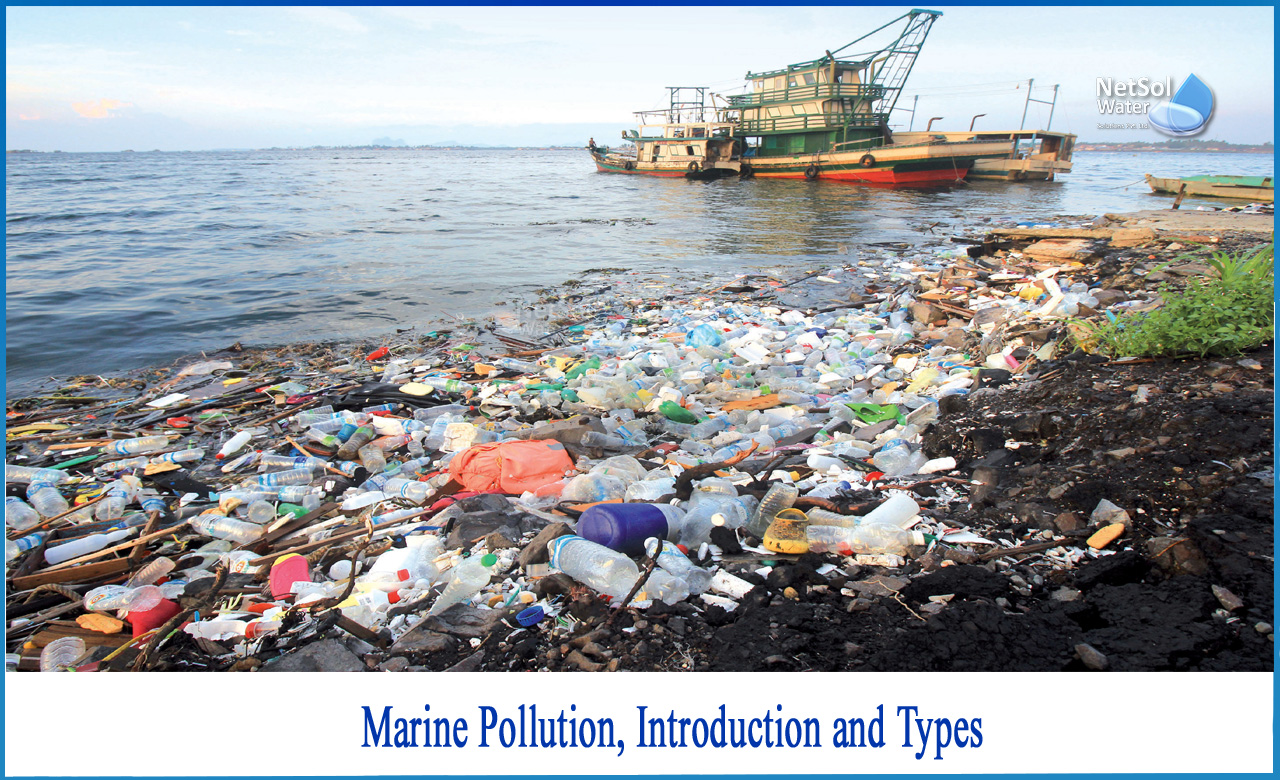What is marine pollution and its types?
When substances utilised or spread by people, such as industrial, agricultural, and residential trash, particulates, noise, excess carbon dioxide, or invading creatures, reach the water and have adverse impacts, this is referred to as marine pollution.
The majority of this trash (80%) comes from land-based activities, although marine transportation also plays a significant role. Since the majority of inputs come from land, whether through rivers, sewage, or the atmosphere, continental shelves are more susceptible to pollution.
Air pollution contributes to ocean contamination by transporting iron, nitrogen, silicon, carbonic acid, sulphur, pesticides, and dust particles. Nonpoint sources of pollution, such as wind-blown debris, agricultural runoff, and dust, are common. These nonpoint sources are primarily due to runoff that reaches the ocean via rivers, but wind-blown debris and dust can also play a role because these pollutants can settle into waterways and oceans. Direct discharge, land runoff, ship pollution, atmospheric pollution, and, potentially, deep sea mining are all examples of pollution pathways.
Types of Marine Pollution
Waste from marine debris, ocean acidification, nutrient pollution, plastic pollution, including microplastics, poisons, and underwater noise are all examples of marine pollution.
Plastic pollution in the ocean is a sort of marine pollution caused by plastics, which can range in size from big original materials such as bottles and bags to microplastics created by fragmenting plastic material. The majority of marine debris is abandoned human garbage that floats or is retained in the ocean. Marine life is harmed by plastic pollution.
Growth of harmful algal blooms in marine life
Another issue is fertiliser (nitrogen and phosphorus) runoff from intensive agriculture, as well as the discharge of untreated or inadequately treated sewage into rivers and, ultimately, the oceans. The nitrogen and phosphorus nutrients which are also found in fertilisers encourage phytoplankton and macroalgal growth, which can result in hazardous algal blooms (eutrophication), which are harmful to both humans and marine life.
Excessive algal development can potentially suffocate delicate coral reefs, resulting in biodiversity and coral health loss. A second key worry is that algal bloom degradation can result in oxygen depletion in coastal waters, a condition that could intensify as climate change limits diffusion of the water column.Many potentially harmful compounds cling to small particles, which are ultimately consumed by plankton and benthic organisms, the majority of which are deposit or filter feeders. Pollutants are concentrated upward within aquatic food systems in this fashion.
Introduction of pesticides
When pesticides are introduced to the marine ecology, they are swiftly absorbed by the food webs. Once these pesticides enter food webs, they can trigger mutations and diseases that are hazardous to humans as well as the entire food chain. Toxic metals can also be introduced into the food webs of marine animals. Tissue matter, biochemistry, behaviour, reproduction, and growth in marine life can all be affected. In addition, many animal feeds contain a lot of fish products or fish hydrolysate. Toxins from the sea can be transported to land animals and then end up in meat and dairy products.
Conclusion
Because the world's population is rapidly increasing, pollution in the ocean is also increasing. However, it is our responsibility as responsible citizens to safeguard our marines from dangerous trash and toxics.
Netsol Water recognises their importance, and as a result, we are attempting to raise as much awareness as possible about marine pollution and its solutions.
Netsol Water is Greater Noida-based leading water & wastewater treatment plant manufacturer. We are industry's most demanding company based on client review and work quality. We are known as best commercial RO plant manufacturers, industrial RO plant manufacturer, sewage treatment plant manufacturer, Water Softener Plant Manufacturers and effluent treatment plant manufacturers. Apart from this 24x7 customer support is our USP. Call on +91-9650608473, or write us at enquiry@netsolwater.com for any support, inquiry or product-purchase related query.



